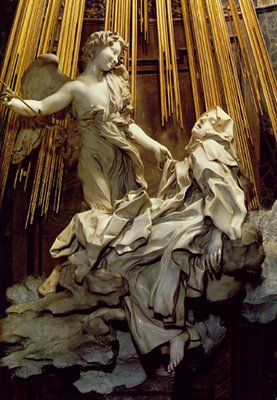
Gian Lorenzo Bernini - The Ecstasy of Saint Theresa (1652)
'The desire to go keeling helplessly over, that assails the innermost depths of every human being is nevertheless different from the desire to die in that it is ambiguous. It may well be a desire to die, but it is at the same time a desire to live at the limits of the possible and the impossible with ever-increasing intensity. It is the desire to live while ceasing to live, or to die without ceasing to live, the desire of an extreme state that Saint Theresa has perhaps been the only one to depict strongly enough in words. "I die because I cannot die". But the death of not dying is precisely not death; it is the ultimate stage of life; if I die because I cannot die it is on condition that I live on; because of the death I feel though still alive and still live on. St Theresa's being reeled, but did not actually die of her desire actually to experience that sensation. She lost her footing but all she did was to live more violently, so violently that she could say she was on the threshold of dying, but such a death as tried her to the utmost though it did not cease to make her live.'
From Eroticism: Death and Sensuality by Georges Bataille
'Affirming and denying, appreciating and depreciating, express the will to power just as acting and reacting express force... Affirmation is not action but the power of becoming active, becoming active personified. Negation is not simply reaction but a becoming reactive.'
From Nietzsche and Philosophy by Gilles Deleuze
'I saw in his hand a long spear of gold, and at the iron's point there seemed to be a little fire. He appeared to me to be thrusting it at times into my heart, and to pierce my very entrails; when he drew it out, he seemed to draw them out also, and to leave me all on fire with a great love of God. The pain was so great, that it made me moan; and yet so surpassing was the sweetness of this excessive pain, that I could not wish to be rid of it. The soul is satisfied now with nothing less than God. The pain is not bodily, but spiritual; though the body has its share in it. It is a caressing of love so sweet which now takes place between the soul and God, that I pray God of His goodness to make him experience it who may think that I am lying.'
From Saint Theresa's autobiography: The Life of St. Theresa of Jesus